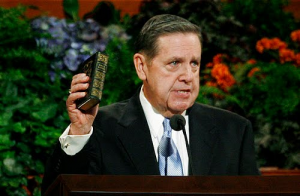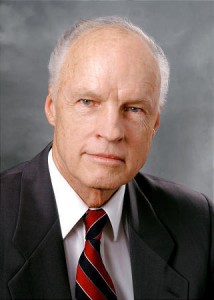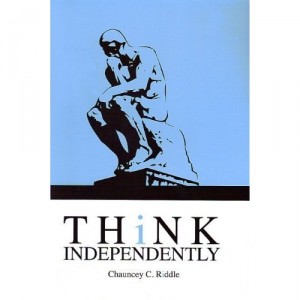Chauncey Cazier Riddle graduated from Brigham Young University and received his MA and PhD degrees in philosophy from Columbia University in the city of New York. He taught at BYU for 40 years, serving as Professor of Philosophy, Chairman of the Department of Graduate Studies in Religious Instruction, Dean of the Graduate School, and Assistant Academic Vice President.
He has written articles for the Ensign, This People, FARMS, Sunstone, Brigham Young University Studies, Deseret Language and Linguistics, the Encyclopedia of Mormonism, as well as other publications. While his Education Week and Sperry Symposium loyal following always packed the halls of the larger rooms at BYU for more than three dozen years.
He is quoted by apostles like Jeffrey R. Holland,
“His Father in Heaven asks Cain, “Where is Abel thy brother?” and Cain fires back, “I know not: Am I my brother’s keeper?” (Genesis 4:9) Maybe the answer to that question is—as Professor Chauncey Riddle once said to me—”No, Cain, you are not expected to be your brother’s keeper. But you are expected to be your brother’s brother.” (On Earth As It Is in Heaven, p. 142)
One of his many close friends was Dr. Truman Madsen, of whom Dr. Riddle used many of his publications in his philosophy classes.
Dr. Riddle had many student teachers that worked closely with him like Monte F. Shelley who taught a course with Dr. Riddle for six years:
“For several years I had the privilege of helping Chauncey teach an Honors philosophy course. He discussed three key questions of both philosophy and religion: How do we know? What is the nature of God, man and the universe? and What is good or right? He then contrasted the basic answers of philosophers with those of the restored gospel of Jesus Christ. The students and I gained a greater understanding of, appreciation for, and testimony of the gospel. This book introduces readers to the questions and answers Chauncey discussed in class. These ideas significantly improved my thinking and my life. Now I can share these ideas more easily with family and friends” — Monte F. Shelley
He debated Lowell L. Bennion at a much heralded debate entitled “Liberalism vs Conservatism,” and Richard Poll on campus in the early sixties.
In 2009, he finally broke down and wrote a book, called THiNK INDEPENDENTLY, How to Think in this World but Not Think With It.
The back cover of his book says:
Skepticism is the backbone that unifies all religions, philosophies, science, and thoughtful inquiry. They all reject the idea that life without thinking and patter is sufficient. The purpose of all religions, philosophies, science and thoughtful inquiry is to allow human beings to better their life and situation by looking skeptically at whatever exists at the moment and asking how the situation could be made better.
Chauncey Riddle has done something other bright and capable people such as Hugh Nibley have done for me, opened the door to a complex subject to a layman. I think many who don’t share LDS beliefs will consider it dogmatic, but to a believer as I am, it provides a very useful comparison of traditional philosophy to what I believe. I am not sure I completely accept what is written, but neither do I reject it out of hand. I need more time to consider it. Thank you, Dr. Riddle. I miss your son, Mark.
Wade W. Fillmore
His students went on to do many great things. Some like Jon D. Green, published the impact he had on them in the same publications as Chauncey had done decades later:
I also remember Chauncey Riddle’s beginning philosophy class because he used a modified Socratic method: probing for our answers to philosophical issues rather than loading us with information that we would likely soon forget. The final paper required us to formulate our own philosophy: our own ethics, epistemology, logic, aesthetics, and metaphysics. It was a revelation to me that philosophy involved me in a deeply personal way, that I even had a personal philosophy. – Jon D. Green – Zion and Technology: A Not-So-Distant View – 7 May 1996 – Brigham Young University 1995-96 Speeches




Hi Dr. Riddle. I’ve just read your essay ‘As a Prophet Thinketh in His Heart, So Is He: the Mind of Joseph Smith’. I have been captivated by what you have said, and I will still be reading it until my goal is met. There is one paragraph that starts “One measure 0f the degree of evil a person is perpetrating…….But a being cannot become righteous until he is willing to share with everyone – with his enemies…….and also with God, Satan, rocks, trees…….” I wonder if you could explain to me your inclusion of Satan? I need to feel comfortable doing that! Thank you. Kindest regards, Roy
Roy,
I have forwarded your question to Dr. Riddle and await his reply. Thanks for the comment and question.
Ken
Roy: If I were writing this today I would not include Satan in that list, especially for the reason that it raises questions such as yours. I think my original intent was to point out that since Satan is our brother from our pre-mortal spiritual existence, we need to show respect for him, at least. We are supposed to love our enemies, and Satan is our greatest enemy. Thanks for the question. C. C. Riddle
Thank you for your reply Dr. Riddle. I do now understand why you included Satan. I have pondered Satan’s role in the plan of salvation. Satan is God’s son, who made a bad choice; it concerns me a bit, to think that a spiritual brother of mine, has deprived himself of his Father’s love, for eternity. I think I’ll play it safe, and at least have a loving sympathy for him. Thank you, and I wish you a happy new year. Roy
After almost 30 years away, my family and I are returning to Provo, where I had the privilege of once serving as Chauncey’s research assistant. We were exploring “Open Systems Thinking” at the time. Would love to reconnect. Ken, might you be able to facilitate a reunion?
John
I forwarded your email to Chauncey.
Ken
I am a cousin of Chauncey and need to contact him to tell him of my aunt Nancy Riddle Huffinton’s passing. My mother is Loa Riddle Long. If possible email me and I will provide an phone number he can contact me on. Thank you, Russ
Pingback: It's About Time: Science and Religion | It's About Time